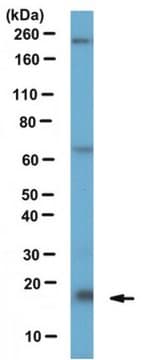C7736
Anti-Centrin antibody produced in rabbit
affinity isolated antibody, buffered aqueous solution
Synonyme(s) :
Anti-CEN1, Anti-CETN
About This Item
Produits recommandés
Source biologique
rabbit
Niveau de qualité
Conjugué
unconjugated
Forme d'anticorps
affinity isolated antibody
Type de produit anticorps
primary antibodies
Clone
polyclonal
Forme
buffered aqueous solution
Poids mol.
antigen 21 kDa
Espèces réactives
human
Technique(s)
microarray: suitable
western blot: 1:2,000 using 293-T exp.Hu.Centrin-1LY117608 or 293-T exp.Hu.Centrin1-FLAG LY401316
Numéro d'accès UniProt
Conditions d'expédition
dry ice
Température de stockage
−20°C
Modification post-traductionnelle de la cible
unmodified
Informations sur le gène
human ... CETN1(1068)
Description générale
Three separate centrin genes have been identified in human cells: centrin 1, 2, and 3. Centrin 1 shows strong amino acid homology to centrin 2 (85%), but lower homology to centrin 3 (54%) and CDC31 (50%) from the yeast S. cerevisiae. Centrin has a fundamental role in the MTOC structure and function. Phenotypic analysis of mutants in Chlamydomonas caltractin and the yeast CDC31 genes have indicated that the protein is required for proper duplication and segregation of the MTOC in the respective cells.
Immunogène
Application
- immunofluorescence
- immunoblotting
- immunofluorescence microscopy
Actions biochimiques/physiologiques
Forme physique
Clause de non-responsabilité
Vous ne trouvez pas le bon produit ?
Essayez notre Outil de sélection de produits.
En option
Code de la classe de stockage
10 - Combustible liquids
Classe de danger pour l'eau (WGK)
WGK 2
Point d'éclair (°F)
Not applicable
Point d'éclair (°C)
Not applicable
Certificats d'analyse (COA)
Recherchez un Certificats d'analyse (COA) en saisissant le numéro de lot du produit. Les numéros de lot figurent sur l'étiquette du produit après les mots "Lot" ou "Batch".
Déjà en possession de ce produit ?
Retrouvez la documentation relative aux produits que vous avez récemment achetés dans la Bibliothèque de documents.
Notre équipe de scientifiques dispose d'une expérience dans tous les secteurs de la recherche, notamment en sciences de la vie, science des matériaux, synthèse chimique, chromatographie, analyse et dans de nombreux autres domaines..
Contacter notre Service technique






